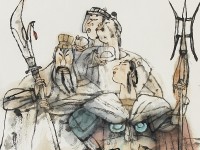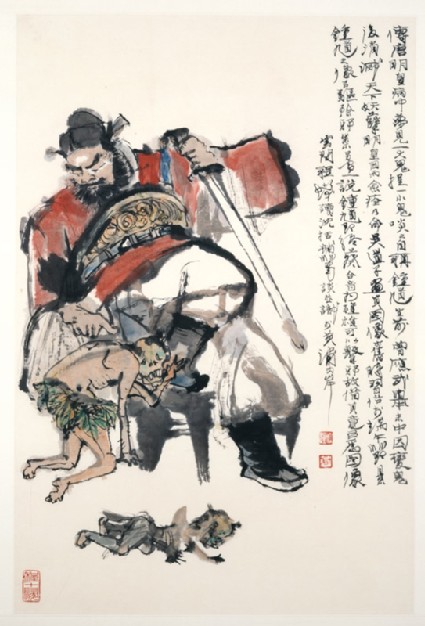Beauties and Heroes: Legends and Stories in Chinese Art
(from 21st Jan until 15th Jul 2012)Explore paintings, prints and papercuts depicting legendary figures from Chinese folklore.

Zhong Kui the demon queller
-
Description
The legend of Zhong Kui was first recorded by the Northern Song dynasty writer Shen Kuo (1031-1095) in his Dream Pool Essays, cited in the inscription of this painting. It explains how the Emperor Xuanzong dreamt of an ugly scholar named Zhong Kui who caught demons for him. The Emperor then commissioned a master of figure painting, Wu Daozi, to paint Zhong Kui’s portrait which he approved as a vivid depiction of the dream. Since then, Zhong Kui has been a popular figure in religious, literati, and folk paintings. He was also a favourite subject of Cheng Shifa, from Shanghai, who specialised in figure painting.
-
Details
- Associated place
-
Asia › China › Shanghai province › Huangpu river (place of creation)
- Date
- 1921 - 1995
- Artist/maker
-
Cheng Shifa (1921 - 2007) (artist)after Shen Kuo (1031 - 1095) (author)
- Material and technique
- ink and colour on paper
- Dimensions
-
frame 137 x 86.8 x 2.2 cm (height x width x depth)
painting 103.4 x 68 cm (height x width)
- Material index
- Technique index
- Object type index
- No. of items
- 1
- Credit line
- Presented in honour of the forthcoming 70th birthdays of Jose Mauricio and Angelita Trinidad Reyes, 1995.
- Accession no.
- EA1995.180
-
Further reading
Oxford: Ashmolean Museum, 24 September-1 December 1996, Modern Chinese Paintings: The Reyes Collection in the Ashmolean Museum, Oxford, Vainker, Shelagh (Oxford: Ashmolean Museum, 1996), no. 13 on p. 23, pp. 9 & 30, illus. p. 23 fig. 13
Glossary
Zhong Kui
-
Zhong Kui
Zhong Kui, or Shōki in Japanese, is a figure from Chinese folklore who appeared to the ailing 8th century Chinese Emperor Xuanzong in a dream and dispatched the demons that were haunting him. Shōki promised the Emperor that he would rid the world of demons.
Past Exhibition
see (1)Location
-
- currently in research collection
Objects are sometimes moved to a different location. Our object location data is usually updated on a monthly basis. Contact the Jameel Study Centre if you are planning to visit the museum to see a particular object on display, or would like to arrange an appointment to see an object in our reserve collections.
Publications online
-

Modern Chinese Paintings: The Reyes Collection in the Ashmolean Museum, Oxford
Zhong Kui, associated with upholding righteousness and opposing evil is a popular figure in Chinese legend and appears in Daoist, Buddhist and folk paintings from as early as the Tang dynasty. Shen Kuo is a famous Northern Song (960-1127) dynasty writer, and one of the first to record the legend of Zhong Kui; the Huangpu River runs through the artist's native city of Shanghai. Cheng Shifa specialised in figure painting and this powerful image is representative of his best work in the genre.
Notice
Objects from past exhibitions may have now returned to our stores or a lender. Click into an individual object record to confirm whether or not an object is currently on display. Our object location data is usually updated on a monthly basis, so please contact the Jameel Study Centre if you are planning to visit the museum to see a particular Eastern Art object.
© 2013 University of Oxford - Ashmolean Museum


